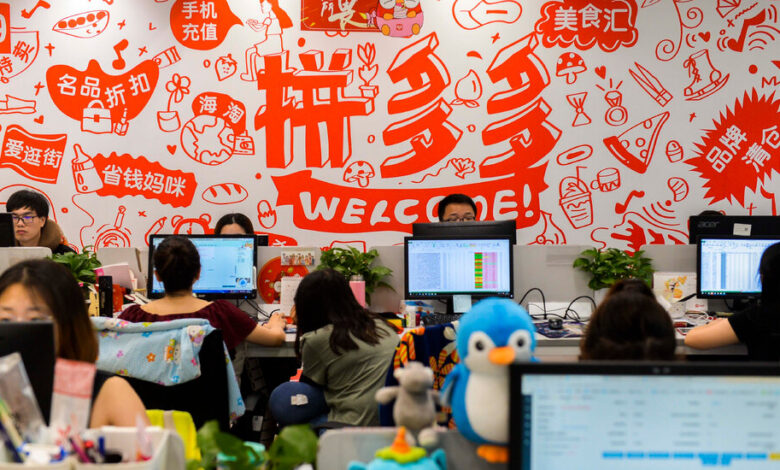China’s Pinduoduo Has Reshaped Discount Shopping

When Pinduoduo, the Chinese discount shopping app, debuted nearly a decade ago, the tech giants Alibaba and JD.com dominated China’s e-commerce business.
Pinduoduo felt more like a gimmick than a future rival. It was a combination of a game arcade, a shopping mall and a social network. Its main selling point was lower prices for shoppers who recruited other buyers to make group purchases. Customers could pass the time by playing video games or earn money by logging in daily to browse the app.
Now, no one is taking the company lightly.
Pinduoduo is the sister company of Temu, the bargain shopping app that has amassed tens of millions of users outside China, including in the United States, where it is spending billions of dollars on promotion. Americans who haven’t used Temu yet have probably seen its Super Bowl ads or Instagram posts.
Like TikTok, Temu is the foreign version of a highly successful Chinese company. As its popularity has grown in the United States, its business practices have also come under scrutiny. Members of Congress have questioned whether it is providing a U.S. channel for products that are made in China using forced labor. It has encountered criticism for its labor practices and failure to enforce intellectual property laws.
Inside China, Pinduoduo has also been gaining more attention. As a popular destination for inexpensive groceries and household items, it is now closing in on JD, China’s second-biggest online retailer, in terms of market share. And when it briefly overtook Alibaba as the country’s most valuable e-commerce firm last year, Alibaba’s founder, Jack Ma, sent an internal memo imploring his company to “change and adapt” to keep up.
Last month, PDD Holdings, the parent company of Pinduoduo and Temu, reported that its annual revenue nearly doubled in 2023, while Alibaba’s and JD’s revenue grew less than 10 percent. The company called the result a “pivotal chapter” in its history.
Pinduoduo has successfully capitalized on one of China’s biggest economic challenges: sluggish consumer spending and falling prices for food and other items. As the country’s growth has slowed, consumers are embracing a lifestyle of so-called downgraded spending centered on Pinduoduo purchases.
It was different when Pinduoduo emerged in 2015. China’s rapid growth over the preceding decades had instilled confidence that an expanding middle class would continue to flex its newfound wealth with lavish spending.
Around that time, Alibaba opened a chain of supermarkets, selling king crab legs, 30-year-old single malt Scotch whisky and other luxury items. JD started an e-commerce portal called Toplife for premium brands.
“The biggest mistake at the time was this belief that China had become filled with middle-class consumers, and that it would just go up and up into the future,” said Robert Wu, editor of the Baiguan newsletter, which is focused on investment and business in China.
In a 2018 interview, Pinduoduo’s founder, Colin Huang, who is now China’s second-richest person, said it was trying to satisfy not just China’s nouveau riche but also people outside of “Beijing’s fifth ring,” a colloquialism for financially struggling people who live far from China’s main cities.
Pinduoduo, which did not respond to requests for comment, grew by word of mouth because it offered steep discounts. Sharing the bargains online was easy because Pinduoduo was deeply intertwined with Tencent’s WeChat, a ubiquitous messaging service in China. Within one year, Pinduoduo had 100 million users. After five years, it surpassed Alibaba with 788 million users.
In a 2023 report, Goldman Sachs estimated that Pinduoduo accounted for 19 percent of China’s e-commerce market by value of products sold, compared with 20 percent for JD and 41 percent for Alibaba.
Shoppers on Pinduoduo deal directly with suppliers, farmers and manufacturers to get low prices. The company keeps its fees to users and sellers low, and has avoided heavy investments by outsourcing its logistics to other companies. Mr. Huang once said he wanted Pinduoduo to be like Facebook for shopping, a destination where people gathered without necessarily intending to shop.
After Pinduoduo’s success, social commerce is now the norm in China. Every e-commerce app features live shopping with influencers testing new products and responding to user questions. Some of China’s biggest social networks are shopping destinations. These include Xiaohongshu, the country’s version of Instagram, and Douyin, the app owned by ByteDance, which runs TikTok outside China.
The main appeal of Pinduoduo is its shockingly low prices. A 5.5-pound box of cherry tomatoes costs about $4.50, but the price per box is cut in half if another person joins to make a “team purchase.” A dozen rolls of five-ply toilet paper cost 80 cents. Both are delivered free.
In its early days, Pinduoduo was overrun with knockoffs. It took aggressive steps to address the issue. Buyers who receive counterfeit goods are eligible for a refund of up to 10 times their money from the seller. Sellers provide a refund with no questions asked if a customer is dissatisfied with a purchase.
Rainbow Wang, an English teacher in Beijing, said she was a devoted Pinduoduo shopper for daily items such as fruit, vegetables, rice and yogurt. She gets even bigger discounts by paying for a $1.50 monthly membership.
Ms. Wang said she loved the low prices, free shipping and generous return policy. There used to be more discounts, she said, but she will continue to shop there because “its stuff is still cheap.”
For sellers, the huge traffic to the app is the draw. Marcus Ding, general manager of a sporting goods company, said he made more money on Pinduoduo because of its lower seller fees. But about a fifth of the revenue he generates on Pinduoduo goes back into promoting his products on the platform. Pinduoduo makes most of its money from advertising on the site. Last year, about two-thirds of its revenue came from sellers paying for product listings to appear prominently.
The advertising model was most likely influenced by Google, where Mr. Huang worked as an engineer from 2004 to 2007. Pinduoduo’s ads are sold using a Google-like auction system to bid on keywords.
There are other signs of Google’s influence.
In a 2018 filing for an initial public offering on the Nasdaq exchange, Mr. Huang, who left Pinduoduo in 2021 but remains its biggest shareholder, started a letter by declaring that “Pinduoduo is not a conventional company.” Fourteen years earlier, Larry Page and Sergey Brin, Google’s founders, famously opened their I.P.O. letter in the same way.
Google declared that one of its principles was “Don’t be evil.” Mr. Huang echoed that sentiment, too. “We may not always be understood, but we always do things out of good will and do no evil,” he wrote.
Such statements of altruism run at odds with some of the company’s tactics, critics say. Last year, the Google Play store suspended Pinduoduo’s app outside China after cybersecurity experts found that it was laced with malware. And Pinduoduo is likely to face more scrutiny because of Temu’s success. It is one of the most downloaded apps in the United States and expanding into dozens of other countries.
Temu does not sell groceries, focusing on clothes, beauty products and gadgets. Much like Pinduoduo’s customers in China, Temu’s shoppers buy products directly from manufacturers and vendors. It is probably losing money on most orders because of its low prices.
With most of Temu’s products originating in China, it costs an estimated $11 per order to ship products to the United States and $9 to $10 per order for shipments to Europe and Australia, according to Robin Zhu, a Chinese internet analyst at Bernstein Research.
Last month, Chen Lei, PDD Holdings’ co-chief executive and chairman, told analysts that Temu’s global expansion was at an early stage with many uncertainties. But it is working off a lesson from China: Consumers always want more savings.



